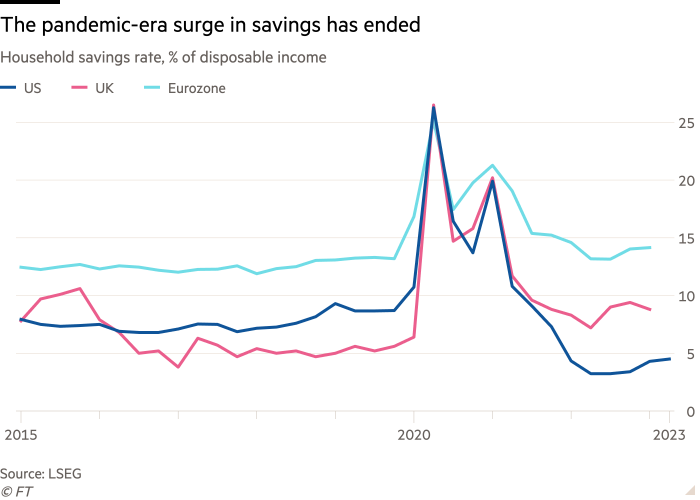Obtain free Coronavirus financial affect updates
We’ll ship you a myFT Each day Digest e-mail rounding up the most recent Coronavirus financial affect information each morning.
Central bankers have spent the previous few years battling unknowns. Would the value of stuff fall because it turned much less of a nightmare to supply it? Might firms gradual their hiring with out happening a firing binge? And would the hoards of money amassed in the course of the pandemic be spent? Now, because the Federal Reserve, Financial institution of England and ECB appear more likely to pause their interest-rate rises, that third supply of uncertainty is fading. Broadly talking, whereas in America households selected to spend down their piles of additional cash, in Britain and the eurozone they held again.
It’s not uncommon for folks so as to add to rainy-day funds throughout recessions. However the surge in financial savings in the course of the pandemic was extraordinary. On the peak in the course of the first quarter of 2020, households within the eurozone, Britain and America have been hoarding 1 / 4 of their disposable earnings. This went far past regular precautions, and even the will to shift spending from as we speak to tomorrow. They have been saving as a result of lockdowns stopped them from doing a lot else.

As life returned to regular, central bankers watched warily. Submit-pandemic situations have been difficult sufficient; a rush of spending would buoy costs and make preventing inflation tougher. Historic expertise recommended they need to be careful. Through the second world conflict, American rationing contributed to an unlimited rise in financial savings. A working paper by Gillian Brunet of Smith School and Sandile Hlatshwayo of the Council of Financial Advisers discovered that locations that noticed the largest will increase went on to see the next share of individuals splurging on fashionable loos, electrical fridges and motor automobiles.
After adjusting for inflation, 2022 noticed actual incomes in America fall. However on the identical time actual spending elevated. The financial savings price plunged to under its pre-pandemic degree. Folks have been making an attempt to keep up their dwelling requirements — honest sufficient. However the Fed didn’t thank them.
Betting in opposition to the American shopper is daring. But there are indicators that the supply of their spree could also be drying up. Economists on the Federal Reserve Board have predicted that as of the third quarter of this yr (ie now) America’s extra family financial savings can have been spent. Evaluation by Chris Wheat of JPMorgan Chase means that earlier than the pandemic folks tended to carry the money equal of two to a few weeks’ value of spending of their financial institution accounts, with poorer households holding a bit much less and richer ones holding a bit extra. On the peak, that rose to about 4 weeks. However now, behaviour has largely returned to the way it was earlier than.
The expertise within the eurozone has been fairly totally different. With the notable exception of Italy, households have tended to carry again. The eurozone financial savings price has not crashed, however returned to roughly pre-pandemic ranges. (In Britain increased pension contributions imply it’s nonetheless elevated.)
Why has the response both facet of the Atlantic been fairly so totally different? On September 21, members of Britain’s Financial Coverage Committee recommended that increased shopper confidence in America may have contributed. Eyeballing OECD indicators, Britons do appear to have been gloomier than People because the begin of 2022. However regardless of a conflict on their doorstep, customers of the euro don’t.
The distinction might be all the way down to the character of the federal government help in the course of the pandemic. European help centered extra on retaining folks of their jobs. The US stimulus cheques have been comparatively untargeted and progressive, so extra more likely to be spent. However whereas placing, the position of these money handouts shouldn’t be overstated. Given survey proof that a couple of third of individuals saved them, they will solely account for round a tenth of the surplus.
As time passes it seems to be decreasingly seemingly that Britain and the euro space will mimic American behaviour. A bulletin by economists on the ECB finds that whereas US households stored their extra financial savings constructed up in money deposits, these within the eurozone didn’t. As an alternative, financial savings in much less liquid kinds elevated above their pre-pandemic development. That has main implications for the probabilities of the money being spent. Whereas folks are likely to eat about half of a lift to their liquid belongings, the share is nearer to five per cent from the illiquid kind.
Economists at Goldman Sachs have reasoned that collected financial savings are solely a only a few per cent of family monetary web value, and are more and more being managed like different belongings. It additionally appears unlikely that there’s a lot pent-up demand but to be unleashed. If the grandparents needed to go on a cruise, they most likely would have passed by now. Maybe the stash may be used to cushion spending in case a recession strikes. However the danger of a surge is ebbing.
